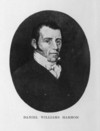Cartier in History

Source: Courtesy of Wikimedia Commons
Sir George-Étienne CARTIER ranks among the great builders of Canada. These are the concluding words of his biographer:
“The news [of Cartier’s death] reached Ottawa in the beginning of the afternoon [20 May 1873], and John A. Macdonald, after announcing it to the House of Commons, burst into tears; incapable of continuing to speak, he remained with his right arm extended in a dramatic gesture over the empty seat of one who had been his companion for nearly 20 years. …
“Cartier’s disappearance changed Canadian political life a great deal. For the Conservative party in Quebec it was one of the first blows that shook the omnipotence it had known at the beginning of confederation, and which it was not able subsequently to recover. In practice Cartier and Macdonald had been equal political leaders for more than a decade, and the former was never replaced in the search for a Canadian equilibrium. After La Fontaine and Morin, who in a brief period in power gave a new direction to politics, Cartier was the most illustrious of a long line of French Canadian politicians who were determined rightly or wrongly to play a role within institutions which, at first sight, seemed foreign to their spirit and their interests. When we judge him, we must place him in his time, and avoid condemning him in the light of the events that have taken place ... and that he could not reasonably have foreseen.”





